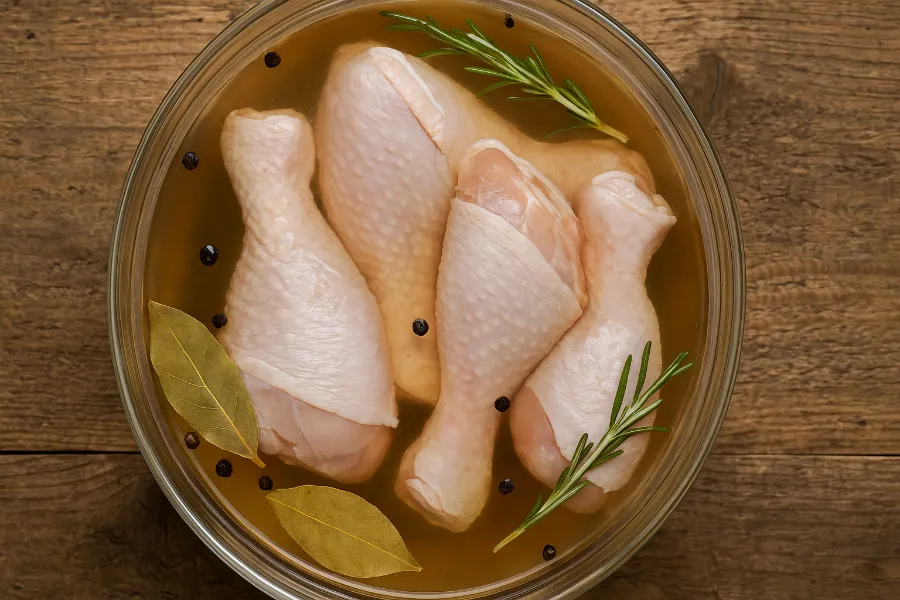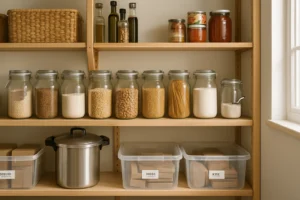I learned the hard way that over brined chicken is a real thing.
The first time I brined a whole bird, I was so proud of my effort until I bit into it. The texture was soft, almost sponge-like, and the saltiness hit like a wave. I remember thinking, “Wait, isn’t brining supposed to make chicken better?”
It is, but like everything in cooking, balance matters. Too little time, and the brine barely does anything. Too much, and your chicken ends up rubbery, overly salty, and waterlogged.
So, let’s talk about what really happens when you brine chicken too long, why it’s not always a disaster, and — most importantly — how to fix it when it happens.
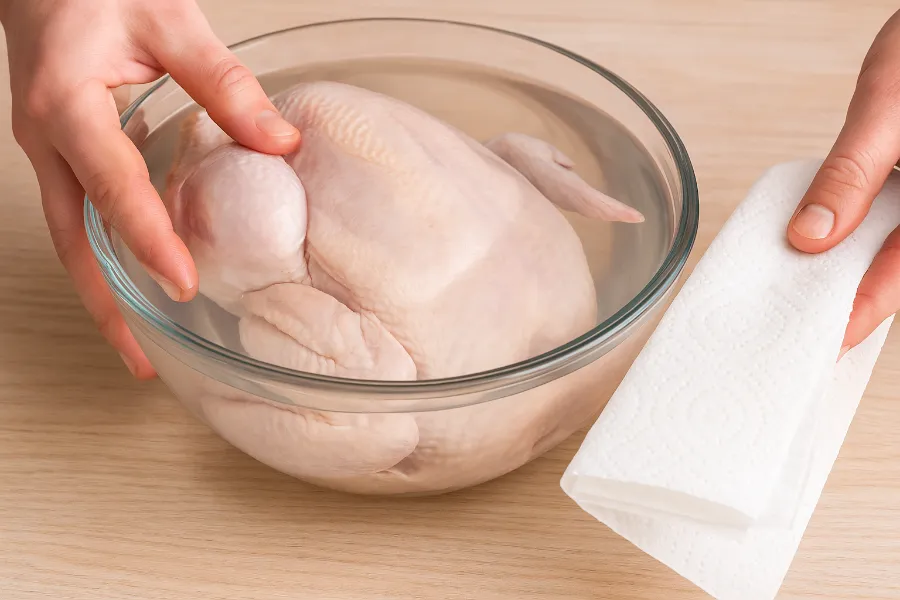
Brining Chicken: The Secret (and the Trap)
Brining chicken is one of those classic kitchen techniques that separates dry, bland poultry from juicy, flavorful success. It works by soaking meat in a saltwater solution, allowing the salt to gently penetrate and season the chicken from the inside out.
When you brine properly, the salt partially breaks down muscle proteins, helping them retain moisture during cooking. That’s why brined chicken stays tender and juicy instead of dry.
But here’s where things go wrong: brining doesn’t stop working when you forget about it in the fridge overnight. The longer it sits, the more salt keeps diffusing into the meat, and those same proteins that made your chicken tender begin to break down too much. The result? A soft, sometimes mushy texture that no amount of sauce can disguise.
Chicken Brine Ratio: Getting It Right from the Start
If you’ve ever ended up with over brined chicken, chances are the problem started with your salt ratio. The amount of salt you use determines how fast and how deeply the brine works.
A mild brine gives you flexibility; a strong one needs strict timing. Here’s the formula I use to keep things balanced:
| Brine Type | Salt Ratio | Ideal Time | Notes |
|---|---|---|---|
| Standard Brine | ¼ cup kosher salt per quart of water | 4–8 hours | Great all-purpose formula |
| Mild Brine | 2 tbsp kosher salt per quart | 12–24 hours | Ideal for overnight soaking |
| Quick Brine | ½ cup kosher salt per quart | 30–90 minutes | Best for thin or boneless cuts |
| Dry Brine | ½ tsp kosher salt per pound of chicken | 6–24 hours | No liquid, lower risk of over brining |
Measure carefully, and remember: the stronger the brine, the shorter the soak time should be.
Wet Brine vs Dry Brine
If you’re deciding between wet brine vs dry brine, it depends on your cooking style and how much time you have.
A wet brine is ideal for adding moisture and seasoning throughout the chicken. It’s especially good for lean cuts like chicken breast or a whole bird that might dry out during roasting or grilling.
A dry brine skips the water entirely. You simply rub salt (and optional herbs or spices) directly onto the chicken and refrigerate it. The salt draws out moisture, dissolves on the surface, and reabsorbs back into the meat, seasoning it deeply without making it soggy.
- Wet brine = extra juiciness but easier to overdo
- Dry brine = crispier skin and less risk of mushiness
If you tend to forget your brining time, dry brine is the safer bet.
How Long to Brine Chicken
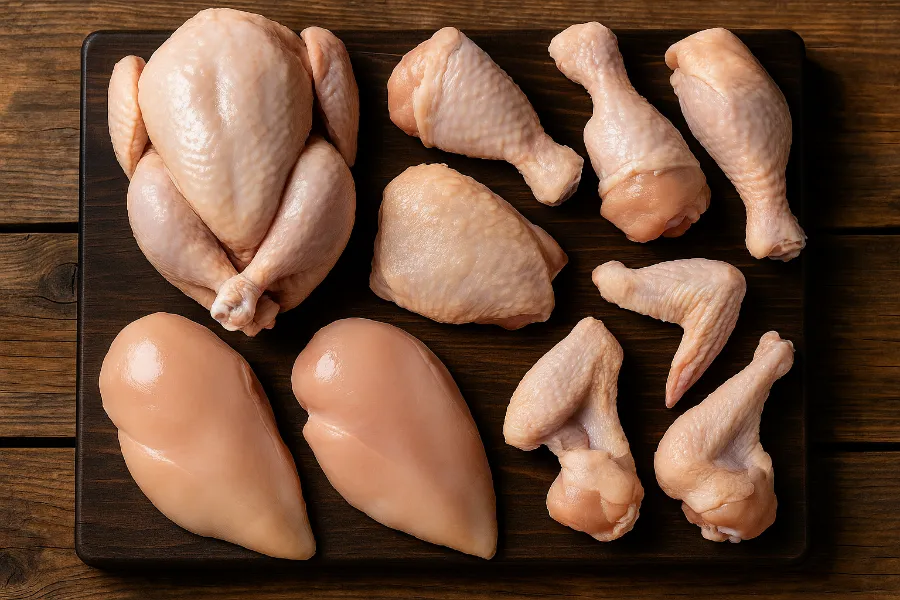
Timing is everything when it comes to brining. You want the salt to penetrate enough to enhance flavor and tenderness — but not so long that it turns into over brined chicken.
Here’s a simple time chart that works for most home cooks:
| Chicken Cut | Ideal Brine Time | Max Safe Time | Notes |
|---|---|---|---|
| Whole Chicken (4–5 lb) | 8–12 hours | 24 hours | Great for roasting |
| Bone-In Pieces | 2–4 hours | 6 hours | Excellent for grilling |
| Boneless Breasts | 30–90 minutes | 4 hours | Quick but sensitive |
| Chicken Wings | 1–2 hours | 4 hours | Absorbs flavor fast |
| Dry Brine (Whole Bird) | 12–24 hours | 48 hours | Best for crispy skin |
Can You Brine Chicken for 24 Hours?
Yes, you can — if your brine is mild. Using about 2 tablespoons of kosher salt per quart of water is safe for a 24-hour soak.
This is my favorite approach for make-ahead meals. It gives the chicken time to fully absorb flavor without going soft. Just make sure it stays refrigerated and rinse it briefly before cooking to remove surface salt.
Can You Brine Chicken for 2 Days?
You can, but it’s risky. Even in a mild brine, 48 hours is a long time for chicken to sit in saltwater. After a day and a half, you may start to notice the first signs of over brining: rubbery edges, darker patches of meat, or an overly salty taste.
If you really need to stretch the brine that long, dilute it halfway through with fresh cold water. That reduces the salt concentration and slows down the brining process.
Can You Brine Chicken for 48 Hours?
At this point, you’re pushing your luck. Two days in a standard brine will almost always result in over brined chicken. The meat becomes overly seasoned and unnaturally soft.
If your schedule demands that much prep time, switch to a dry brine instead. You’ll still get flavorful, tender chicken — without the texture problems that come from leaving it submerged in liquid too long.
Is It Bad to Brine Chicken Too Long?
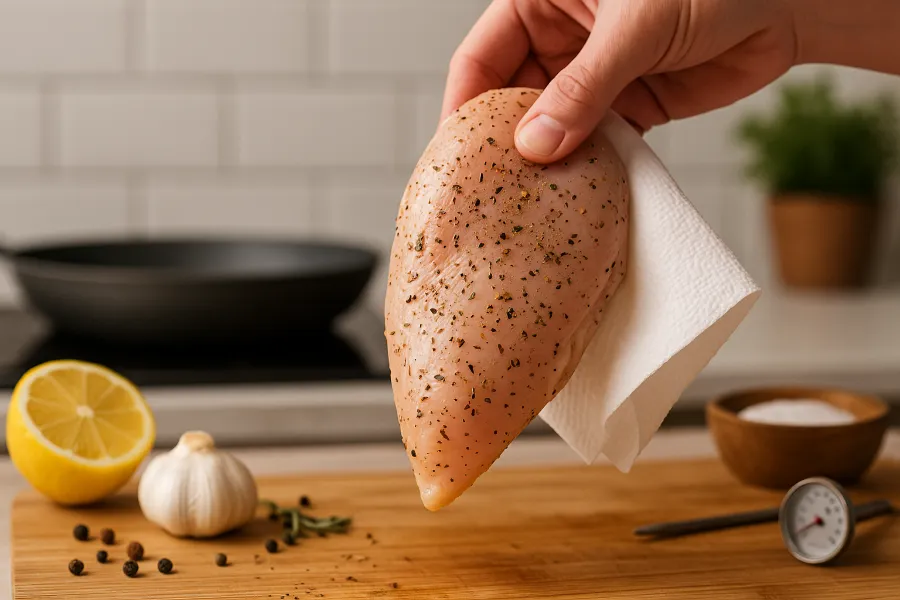
Brining chicken for too long isn’t dangerous, but it does lead to disappointing results.
- Texture: Over brined chicken feels spongy or slippery because the salt has broken down too many proteins.
- Flavor: The natural taste of chicken is lost under an overwhelming layer of salt.
- Appearance: The skin struggles to crisp, and the meat may appear grayish or translucent in spots.
If you’ve gone over the time limit, don’t panic. You can still save it with the right steps.
Chicken Tenderness: When Brine Works (and When It Doesn’t)
When brining is done right, it creates perfectly tender chicken by slightly loosening the muscle fibers and trapping moisture.
However, once that protein structure dissolves too far, tenderness turns to softness — and not the good kind. Instead of juicy, you get limp.
A good rule of thumb:
- Strong brine = short soak
- Mild brine = longer soak
Brining is all about balance, not just time.
Best Brine Time by Chicken Cut
Every cut of chicken absorbs salt differently. The thinner the piece, the faster the brine works. Follow this quick guide to avoid over brining any type of chicken:
| Chicken Type | Ideal Brine Time | Max Safe Time |
|---|---|---|
| Whole Chicken | 8–12 hrs | 24 hrs |
| Drumsticks & Thighs | 2–4 hrs | 6 hrs |
| Boneless Breasts | 30–90 mins | 4 hrs |
| Wings | 1–2 hrs | 4 hrs |
| Dry Brine (Whole) | 12–24 hrs | 48 hrs |
Knowing these times saves you from guesswork — and from another mushy, salty chicken dinner.
Soaking Chicken After Brine
If your chicken has been in brine too long, soaking it in fresh cold water can reverse some of the damage.
This simple step pulls excess salt back out of the meat and evens out the flavor.
Here’s how to do it:
- Rinse the chicken under cold running water for 2–3 minutes.
- Submerge it in a bowl of clean water for 30–60 minutes.
- Change the water halfway through if needed.
- Pat dry thoroughly with paper towels.
This method can reduce surface saltiness and restore some natural texture before cooking.
How to Make Chicken Juicy and Tender (Without Over Brining)
If you’re nervous about brining after reading this, don’t be. There are plenty of ways to make juicy, tender chicken without risking over brining.
1. Brine Smartly
Set a timer or phone reminder. Most over brined chicken happens simply because we forget about it.
2. Use Sugar for Balance
Adding a tablespoon or two of sugar to the brine balances the flavor and helps the chicken brown better during cooking.
3. Add Herbs and Aromatics
Garlic, thyme, lemon zest, and peppercorns enhance taste while offsetting saltiness.
4. Dry the Chicken Before Cooking
Patting the chicken dry ensures crisp skin and better color.
5. Cook by Temperature, Not Guesswork
Use a meat thermometer. Cook breasts to 160°F and thighs to 175°F. Proper cooking is just as important as proper brining.
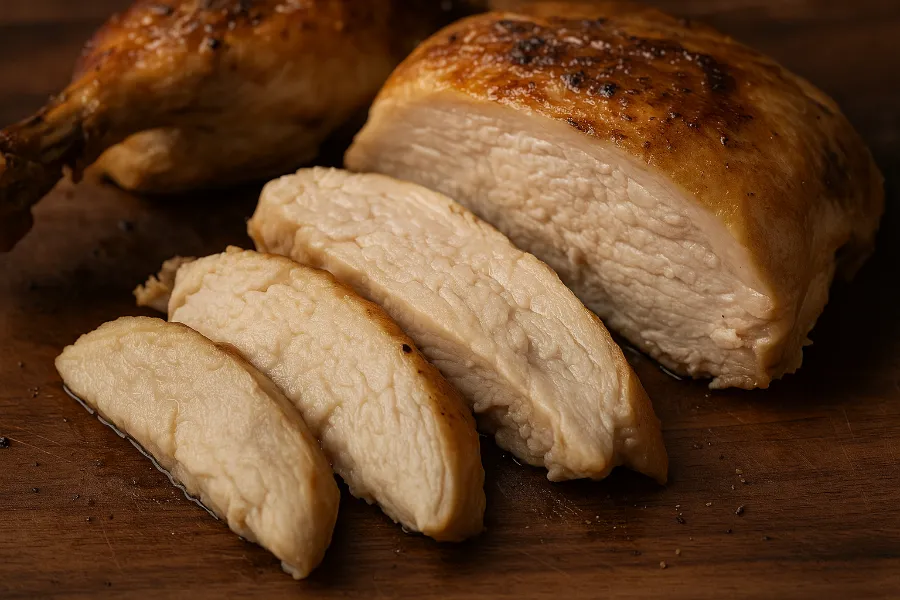
How to Fix Over Brined Chicken
If you’re already dealing with over brined chicken, here’s how to make the best of it.
- Rinse it well to remove surface salt.
- Soak in cold water for 30–60 minutes to draw out more salt.
- Dry completely to encourage browning.
- Use dry heat like roasting or grilling to tighten the texture.
- Balance flavors with sweet, acidic, or creamy sides — honey glaze, lemon butter, rice, or unsalted potatoes work perfectly.
You can’t completely undo over brining, but you can disguise it well enough that no one will notice.
Balancing Flavors in Your Brine
If your chicken tends to come out too salty, try adjusting your flavor base instead of reducing all the salt.
Here are add-ins that balance a brine naturally:
- Sweeteners: Honey, maple syrup, or apple juice
- Herbs: Rosemary, thyme, bay leaf
- Citrus: Lemon or orange slices
- Spices: Peppercorns, coriander, allspice
These ingredients won’t chemically reduce salt, but they add depth that balances the flavor beautifully.
Quick Troubleshooting Chart
| Problem | Cause | Fix |
|---|---|---|
| Too salty | Brined too long or too much salt | Rinse and soak in cold water |
| Mushy texture | Protein breakdown from over brining | Roast or grill to firm texture |
| Pale skin | Too wet before cooking | Pat dry or air-dry in fridge |
| Bland flavor | Salt masked chicken’s natural taste | Add citrus or herb butter |
Final Thoughts on Over Brined Chicken
If you’ve ever made over brined chicken, don’t feel bad — every cook has done it at least once. The important part is understanding why it happens and how to avoid it next time.
Brining is all about balance: the right ratio of salt to water, the correct timing, and proper temperature. When those elements come together, the results are unbeatable — tender, juicy, flavorful chicken every single time.
So don’t give up on brining. Just be mindful. Measure your salt, set a timer, and keep it cold. And if you ever forget and overdo it again, at least now you’ll know exactly how to save it.
FAQs
Over brined chicken becomes overly salty and can develop a mushy or rubbery texture. The salt breaks down too many proteins, causing the meat to lose its natural firmness.
Yes, rinse the chicken under cold water and soak it in clean water for 30–60 minutes. This helps draw out excess salt before drying and cooking.
Yes, it’s completely safe if it’s been kept refrigerated. The issue is texture and flavor, not food safety.
Brine chicken for 30 minutes to 12 hours depending on the cut. Avoid going past 24 hours unless using a mild brine.
It’s not recommended. After 48 hours, the meat often becomes too soft and salty, losing its natural flavor.
Yes, especially after a wet brine. Rinsing removes excess surface salt and helps balance the flavor.
Use a mild brine, add sugar or citrus for balance, and cook to the right temperature. You can also dry brine overnight for juicy, crisp results.

